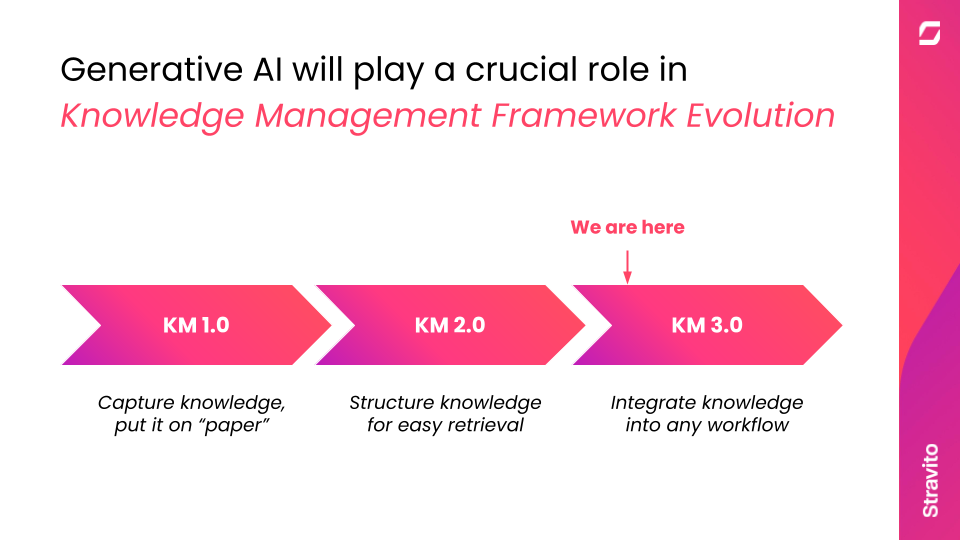What Knowledge Management 3.0 Means for Insights Teams
Imagine it’s the year 2003.
Touch screens and 3G mobile/internet services have been launched. People have been talking about the mobile internet for over 10 years, and pioneering countries like Japan have already given us a glimpse of things to come.
But there is no iPhone.
In fact, the first iPhone won’t be released for another 4 years in 2007. All of the ingredients for such a smartphone exist, but there hasn’t been a user interface to bring these elements all together.
Fast forward to today.
We now know that once those elements were unified in the format of the iPhone, the concept of the smartphone as we knew it evolved into something entirely different, something that we probably couldn’t have even conceived of back in 2003.
Generative AI’s “iPhone Moment”
I would argue that we’ve reached another “iPhone moment” right now with regards to generative AI.
Transformers, LLMs, and Supercomputers were all around in 2010. But it wasn’t until 2022 that the release of ChatGPT combined these elements into an interface that was accessible to millions of people, making it clear how significant the impact of this technology could be.
In the same way that widespread access to smartphones has led to meta changes in human behavior, we foresee that generative AI will also lead to similar meta changes.
For example, smartphones transformed how we communicate with each other; many favor texts over calls, and virtual meetings over real ones. Generative AI can create similar sweeping changes – from how we interact with machines, to our attention spans, to how we share information, and the skills we need to move ahead in our careers.
Introducing Knowledge Management 3.0
When it comes to how these changes will affect insights professionals, I think the area of knowledge management is something to pay extra attention to. I foresee generative AI playing a crucial role in the evolution of knowledge management.
If we think back to what I consider Knowledge Management 1.0, we saw the capturing of knowledge, putting it on paper.
With Knowledge Management 2.0, knowledge was being structured for easy retrieval.
Knowledge Management 3.0, I predict will be largely characterized by the integration of knowledge into any workflow. And I believe generative AI has shifted us to the cusp of this new era of knowledge management.
Personalized, Atomized, Real-Time Knowledge
Up until now, the main focus has been on gathering and sharing information. But now, it’s all about using that information actively. This shift has led to increased personalization in knowledge management, and I think this trend is only set to accelerate.
Because generative AI makes it possible to atomize learnings even further, zooming in on what’s relevant down to the paragraph and even sentence level, and recombining these into unique, summarized answers.
It also creates potential for mixing different types of information, like text, videos, and graphs, to break down barriers between different formats.
And instead of waiting for periodic updates every few months, things now change in real-time. The latest information is almost always at our fingertips.This creates more dynamic answers to our questions, and the fact that we aren’t the ones having to do all the work only adds to this.
Knowledge management is well on its way to becoming a flexible and interactive way for individuals and groups to get the most out of information. Something that most insights professionals I know have long been working to achieve.
The Bottom Line: What Knowledge Management 3.0 Means for Insights Teams
While we can’t truly predict the future (yet), I think it’s safe to say that this era of knowledge management 3.0 that we are entering is going to be really exciting for insights teams. Of course, adoption and wide roll-out of these technologies will take time.
Wise insights leaders can use this time to their advantage and see it as a chance to adjust and prepare their teams for the new reality. Here are some concrete actions you can take already today:
- Be proactive: Take a proactive approach to evolving knowledge management in your organization by identifying concrete use cases where generative AI can be useful, like search.
- Invest in soft skills: Soft skills like communication, critical thinking, and a strategic business partner mindset will become even more important, and the hard skills needed are likely to shift as gen AI becomes more advanced. Prompt writing and fact checking will likely become core hard skills.
- Embrace the opportunity: Given that knowledge management is seen by some experts as being one of the areas that will be disrupted the most by technology, see this as an opportunity for your team to really take the lead within the organization to set the tone for this new chapter.
My ultimate prediction is that people and machines will be teaming up to do great things in the days, months, and years to come. But to make this work in the future, we should prepare ourselves for this change today.
Want to learn more?
Check out the Insights Leader’s Guide to Generative AI
or watch our on-demand webinar on KM 3.0 and what it means for insights teams.










 by
by 



